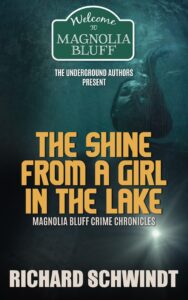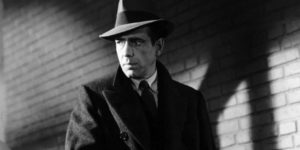The Shine from a Girl in the Lake by Richard Schwindt launches today. It is book number 6 in the Magnolia Bluff Crime Chronicles series. And it is a winner.
Schwindt is one of my favorite contemporary writers. And he may even be on my all time top 10 list. He is that good.
In my previous post, I talked a little bit about mysteries and his latest book. In this post, I thought I’d give you a sample of the goodness that is in store for you when you pick up your copy.
Because if you want fiction that gives you a sense of place, is filled with suspense, is poignant, and is seasoned with humor, then Schwindt’s fiction is for you.
And now, sit back and enjoy the sample.
Week 1
Chapter 1
Sunday afternoon
I knew what a Walker Coonhound could do, but my experience with Butch mostly involved watching him roll over, and invite me to rub his belly on the days I wandered next door to drink with Jack Rice.
This didn’t prepare me for the furious restraint of the animal now stalking beside me in the hot brush, ten miles outside of Magnolia Bluff. His hackles rose stiff as knives, and his mouth curled in a rictus of canine rage and anticipation.
I had thought the recurve bow with a seventy-pound draw would do the job, but now I was not so sure. Deciding to kill a rogue boar, was easy. Executing the plan much more of a challenge. Judging from Butch’s demeanor, we were close indeed.
A review of the topographic map suggested the existence of a hollow in the next hundred yards; adjacent to a gorge, probably ringed with the ubiquitous juniper scrub.
Melanie Fairchild had spent her twenty-fifth year alone in a house in town, self- imprisoned with agoraphobia. She met a charming man online, who lured her out, impregnated her in his trailer, married her, and then ran away for good.
She was left with mixed memories of love and loss, a nice little boy named Seth, and an incentive to get out into the world. She inherited a run-down ranch when her mother passed, and managed to make a quiet living producing soybeans and goat milk.
Melanie counted on me to help keep her anxiety at bay, and manage the stresses of single motherhood.
Now a goddam feral hog threatened to undo her gains.
Two weeks ago, it appeared on the edge of an escarpment situated by the south end of her property. One week later, it had killed her Cocker Spaniel, Lady, while she and Seth watched in horror from the doorway.
Terrified, Melanie had booked three sessions last week. She had one girlfriend driving her to my office at the college, and another, armed, watching Seth, who was no longer allowed to play outside. This hog was smart. She kept a loaded lever action 30-30 by the door, but he didn’t show his ugly face again. She knew he was around, likely in the hollow where the feral hogs clustered.
Psychotherapists are supposed to do therapy; not solve people’s problems for them. Melanie was now 32, pretty, and probably harboring erotic transference for me.
I knew this was a bad idea, but another part of me wanted the thrill of the chase, and to do Jack Rice a favor.
Jack, 72, had been in the wrong part of the Mekong delta in 1968, when his buddy, just ahead, stepped on a Bouncing Betty mine. The other guy was shredded, but Jack lost his left leg, and sent home with a Purple Heart.
It was a bad start to adulthood. Jack stayed single, but forged a good life for himself running a garage, and hunting the hill country with his dog, and prosthesis. Two years ago, diabetes took the other leg. No more hunting, and time to retire.
He took the loss with surprising equanimity, telling me he considered every day since the Tet Offensive a bonus.
He still drank a bit, made his way to the coffee shop to bullshit with the boys, and walked Butch from the seat of his VA issue electric wheelchair. He even drove an old beater truck with hand controls.
I found Jack garrulous and opinionated, but a decent drinking buddy, and a great source of intelligence on local hunting.
“Take Butch with you tomorrow,” he said Saturday night, over a glass of whisky. “You may not find the hog without him, and, hell, it might find you first. Let Butch even the odds. Nothing meaner than a cornered boar.” He wasn’t finished. “And if I thought you’d listen, I’d tell you to take a rifle instead of the recurve. You’ll need to be awful close to hit it square.”
I laughed. “I’ll be fine, Jack. No need to fuss. If I get it, I’ll gut him and bring it back for you to butcher. All I’ll want is a roast and a couple of chops.”
He grinned and raised his glass.
I was a little drunk and cocky, sparing a glance to the friendly dog in the corner. Butch wagged his tail. “What’s he going to do? He’s too nice to hunt.”
“Just take him, stalk the hog, and let him do his thing. I trained him before I lost the leg; he knows hogs better than you.”
I waved away a fly with the corner of my bow as we tramped down a pathway. With the insidious arrival of late afternoon, shadows from the October sun lengthened around me.
As Butch stiffened, I unconsciously drew a broad head arrow from my hip quiver. My sympathetic nervous system activated, I felt the increase in muscle tension, respiration and heart rate.
Without notice, Butch bolted down the path, ears glued to his head. About 15 yards along he turned sharply to the right. That had to be the hollow. I started to jog after him, but he had begun to bay. Finding him would not be a problem.
Now I was running, and turned the corner almost as fast as he had. I pulled up sharply.
Maybe another 15 yards away, Butch was nose to nose with the boar.
No one told me it would be that big; it must have topped 200 pounds, dwarfing the enraged hound. Covered in stiff bristles, it rocked on its feet, obviously ready to fight back, but temporarily intimidated.
Butch never let up the baying, even when the boar noticed my appearance on the fringe of the hollow. That had to be the right hog; he was smart and mean. And he made the smart decision. To charge.
Charge me.
I had the arrow nocked, but he was halfway to me by the time I began my draw. The dog never lost a beat; pivoting, lunging and sinking his teeth into the boars’ ear.
This provided the opportunity to pivot myself, and line up for a clean shot. I drew. Damn dog was in the way. Christ, try telling Jack I shot his dog. Butch wasn’t letting go, probably saving both of us.
I shuffled to one side just as the boar turned to the other. With one fluid motion, I drew and fired.
It screamed like a human being, one long, pained wail, culminating with spindly legs collapsing from under it. Bullseye.
Butch and I felt that crazy elation that follows a kill. He circled the dead boar, panting. And me; I felt like I wanted to show up at Melanie’s house with the carcass, and then fuck her.
I returned to earth quickly. The carcass was promised to Jack, Melanie was vegan, you don’t sleep with clients, and I had a large pig to gut and drag back to my truck. I sighed and removed my pack. Time to dig out the knife. Dark would soon find us.
Butch still panted, while bleeding from one ear and a puncture wound on his thigh. He wagged his tail. The dog was happy.
***
Hope you enjoyed the sample. The Shine from a Girl in the Lake is live today. Get your copy on Amazon!
Comments are always welcome! And until next time, happy reading!
 CW Hawes is a playwright, award-winning poet, and a fictioneer, with a bestselling novel. He’s also an armchair philosopher, political theorist, social commentator, and traveler. He loves a good cup of tea and agrees that everything’s better with pizza.
CW Hawes is a playwright, award-winning poet, and a fictioneer, with a bestselling novel. He’s also an armchair philosopher, political theorist, social commentator, and traveler. He loves a good cup of tea and agrees that everything’s better with pizza.
If you enjoyed this post, please consider buying me a cup of tea. Thanks! PayPal.me/CWHawes
Share This!
